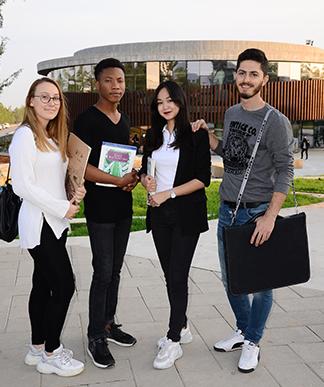Compulsory Courses
First Semester
THEORIES OF INTERNATIONAL RELATIONS
This course provides an analysis of the major theoretical debates of International Relations discipline, including Idealism-Realism, Realism-Pluralism and recent debates in critical International Relations approaches. The course also addresses the level of analysis problem as well as the central assumptions and key concepts of various theories of International Relations; namely postmodernism, normative theory and constructivism, with special emphasis on the basic concepts, and current critique of realism and neo-realism. Theoretical framework of the International Relations discipline will be defined and analyzed in the context of the course. The new theories will also be examined in detail and discussed.
Second Semester
PROBLEMS IN INTERNATIONAL SECURITY
As a sub-field of International Relations discipline, the scope of International Security Studies gradually broadens. Therefore, this course examines major traditional and new theoretical approaches to International Security Studies as well as the different aspects of the contemporary international security issues, events, structures and processes. The course also aims to develop analytical and critical skills of the graduate students to comprehend and discuss the specific cases in the changing conceptual/theoretical framework of International Security by referring to different sectors of security such as military, economy, society, politics, energy and environment.
SEMINAR
Seminar presentation and group discussions on selected topics related to the International Relations program.
Third Semester
THESIS
Supervised independent research on a topic agreed between the student and the supervisor (a faculty member) and approved by the Administrative Committee of the Institute. It is evaluated by a jury of two faculty members and a member from other universities.
Elective Courses
INTRODUCTION TO POLITICAL SCIENCE
INTERNATIONAL ORGANIZATIONS AND GLOBALIZATION
This course examines the role of international organizations in an age of globalization. It also studies the role of state and non-state actors within the context of global governance. The course attempts to analyze the changing dynamics of the international system and the emergence of new actors via discussing current regional and international political, economic, socio-cultural and humanitarian issues pertaining contemporary world affairs. The changing dynamics of globalization, the inequalities created in the world scale and the effect of recent migration trends to international organizations will be covered during the course.
INTRODUCTION TO WORLD POLITICS
POLITICAL PHILOSOPHY
This Course is designed to introduce students of IR the political thought by following the footsteps of the outstanding thinkers from Plato, Aristotle, St. Thomas to Marx, Gramsci, Althusser, and Badiou through an analysis of the political thought of selected scholars along with their contributions to political philosophy. In examining the ideas of those theorists the method to be adopted is both textual and contextual, attempting to give due regard to the thoughts expressed by the authors and the social environments in which they have been expressed. These philosophers will therefore be evaluated and analyzed in their own historical context.
ISSUES IN EUROPEAN INTEGRATION
This course attempts to analyze major issues of European Integration within a theoretical framework. The course begins with an analysis of the major theories of European Integration such as functionalism, neo-functionalism and federalism. On the basis of this theoretical framework, the course will focus on the two main issues of European Integration, which are named ‘supranationalism versus intergovernmentalism’ and ‘widening versus depending’. In the context of this course, the impacts of decisions on the integration processes taken in summits such as Maastricht and Copenhagen will also be examined and discussed. The students will prepare a project about the current issues of the European Union at the end of the semester.
CURRENT WORLD EVENTS
The main purpose of this course is to examine emerging issues of the international system within the framework of traditional and critical theories. Within this context, on one hand, state-centric security conceptualization will be discussed,, on the other hand, it will be aimed to add a new perspective with alternative convergences that focus on economic, political, cultural, humanitarian, social and environmental areas. Within the framework of the lecture, in addition to all of those theoretical approaches, current events and problems will be explained with examples. Furthermore, the security structures in the world’s different regions and the main subjects of the security communities will be evaluated.
MIDDLE EAST IN WORLD AFFAIRS
This Course offers the students of IR a contemporary history and politics of the Middle-Eastern states. This course will examine the nationalist ideologies, processes of nation-building and political change with a particular emphasis on the Fertile Crescent region of the Middle-East. This course will provide an academic background on the Middle East politics through referring basically to issues of legitimacy and stability, leadership, political elites, ideologies and social movements. The topics which will be covered include the Palestinian Question, the Arab-Israeli conflict, intra-Arab rivalries and the role of the military in politics.
POLITICS OF PEACE AND CONFLICT IN DEEPLY DIVIDED SOCIETIES
This course explores the politics of deeply divided societies and focuses upon the ways through which such societies manage their divisions and sustain peaceful politics. Politics of deeply divided societies is characterized by instability and the persistence of conflict. Some deeply divided societies, however, maintain peaceful politics through power-sharing between groups. The course surveys the literatures on ethnic conflict, third party peacemaking, peacekeeping and peacebuilding as well as the power-sharing theory to answer the following questions: What makes the politics of deeply divided societies fractious and unstable? What are the main approaches to manage conflict in such societies? What roles can third party actors assume in bringing about peaceful settlements?
GLOBAL HISTORY
The main goal of this course is to shed light on the emergence of modern society, modern state and modern international system as well as the development process of human civilization. Ancient civilizations, empires and nation-states are also included among the topics of this course. The course will provide the students with introductory information on the transition from feudal age to industrial age, history of the 20th Century and globalization.
HISTORY OF INTERNATIONAL RELATIONS I
DEMOCRATIZATION AND THE CIVIL SOCIETY IN THE MIDDLE EAST
This course is aimed to examine and explore the processes of democratization and civil society movements in the Middle East with an analytical and critical methodology. Specifically, socio-cultural, economic, and political structures and the interplay of the factors and actors within these structures will be the main areas throughout the discussions in this graduate course. In addition, ideological, religious and social dimensions of the democratization and political liberalization processes of the Middle Eastern region will be analyzed and compared with specific countries and cases.
GLOBAL POLITICS
The course provides the analytical tools required to examine the changing nature of the international politics and the emergence of a global political space. It provides a historical understanding of the evolution of global political and economic forces and the ideas that shaped them. It also includes evaluations of the spread of neo-liberal economic orthodoxy, the creation of new multilateral institutions, migration, and debates on global media and the increased interpenetration of the world’s cultures. students are expected to have a profound understanding of core perspectives in international political economy; to learn how the current highly integrated global economy was created and evolved.
HISTORY OF INTERNATIONAL RELATIONS II
CRITICAL THEORIES OF INTERNATIONAL RELATIONS
This course aims to examine and analyze various theories that bring different explanations to the study of International Relations. The course will examine Critical Theory, Postcolonial and Feminist theories of International Relations and question how these theories inform and expand our understanding of international politics. The course examines how critical theory brings different approach than realist/liberal concepts of state conflict and cooperation, how feminist theory brings different explanatory power by including gender to the analysis and how postcolonial theory offers an in depth understanding of the ways ‘other’ is constructed.
ISSUES IN EURO-MEDITERRANEAN POLITICS
This course aims to develop theoretical and empirical background of the students in relation to the political, cultural, economic and security affairs of the countries which are members of the Euro-Mediterranean Partnership. Thus and so the project of Euro-Mediterranean Partnership will be analyzed within the framework of both traditional and critical theories by referring to the three constitutive phases (security and political cooperation, economic cooperation and cultural dialogue) as well as by assessing certain case studies. The relations between the EU and the Euromed States will also be highlighted.
POLITICAL IDEOLOGIES
This course aims at familiarizing master students with the idea of politics in the philosophical context. Philosophers who dealt with the concept of the politics from past to modern times will be studied during the course. In the second phase of the course modern ideologies: Liberalism, Socialism, Marxism, Conservatism, Fascism and Nationalism will be analyzed on the left-right spectrum. Later on contemporary ideologies suh as feminism, ecologism, religious fundementalism, post-modernism, post-colonialism and post-structuralism will be highlighted in relation with and as a critic to the modern political ideologies.
ISSUES IN TURKISH FOREIGN POLICY
The aim of this graduate seminar is to give the students an awareness of the various foreign policy issues that confront Turkey. An attempt is be made to discuss the causes and consequences of the various crises and regional problems between Turkey and neighbors. The Turbo-Greek problems, the Cyprus dispute, Turkey’s relations with the Middle Eastern states, Balkans, and with the Turkish republics of the former Soviet Union, as well as the Turco-American and Turco-European ties are examined. Updated problems such as Syrian migrant crisis and Turkey’s accession process into EU will also be covered during the class
CURRENT ISSUE IN TURKISH FOREIGN POLICY
In this course, the Turkish Foreign Policy from 1960 to present will be discussed by a thematic perspective, which will be accompanied by books and articles. Starting from 1960, International Dynamics and the internal dynamics will be analyzed in parallel; theoretical perspectives like Revisionism, Balance policies, Win-Win, Structuralism will be reviewed in the light of current foreign policies. Turkey’s current relations with Syria and Iran will also be highlighted within the framework of the migrant crisis and accession to EU: What can be the possible openings for Turkish Foreign Policy in its EU project? İs the question to be answered. Russian-Ukraine crisis will be highlighted.
GLOBALIZATION AND INTERNATIONAL POLITICAL ECONOMY
Global political economy course deals with the issues of world economy and world politics by starting with the analysis of the emergence and evolution of the “world system” from the fifteenth century till the current phase of globalization. The course specifically examines the subjects like industrial and financial economic development, periodically emerging economic crises, development and undevelopment problems and economic integration of the global system. The current issue of the global terrorism will also be handled in relation with underdevelopment, and global migration trends.
MEDIA AND INTERNATIONAL CONFLICT
The course examines the cultural, political and economic dimensions of media responses and media coverage of the international conflicts through assessment of different theoretical approaches. The course also provides necessary methodological skills to graduate students in order to comprehend and assess specific cases of media’s involvement in the international conflicts at different level. Topics include war and peace journalisms, politics and economy of conflict reporting and the role of media in conflict resolution. The “conset manufacturing” effect of the global mainstream media in relation to the apprehension of the global terrorism will also be monitored during the courses.
COMPARATIVE ANALYSIS OF WORLD CULTURES
This course aims to analyze different world cultures in a comparative perspective. Why some societies are more rebellious than others? ; Why some are more submissive and loyal to their State? ; What is essence of culture and where is it related to political participation? ; What is what we call “A democratic culture”? ; is there a relation between the education and the political participation? All those questions will be dealt with through a conceptual and theoretical point of view throughout course discussions with the aim of finding out the differences and similarities of various world cultures.
NEW COMMUNICATION TECHNOLOGIES
Focusing primarily on the internet and digital cultures, this course will explore the theoretical and practical debates that have developed around the concept of ‘new media’. Topics to be studied include interactivity, social networking, media convergence, cyberculture and the emergence of ‘web 2.0’. Are these developments anticipated by pre-existing studies of communication practice, or are new theoretical models required to understand them?
ORGANIZATIONAL COMMUNICATION
This course is designed to examine the internal and external communication systems of business organizations. It is also examined that the uses of communication media such as internet and intranet in organizations.
SCIENCE FICTION FILM AND LITERATURE
This course aims to teach students to develop an advanced understanding of critical perspectives in science fiction film and literature. In this context this course focuses on critical skills in thinking about the role of science fiction within contemporary societies. From this point of view, the course examines European and American science fiction literature and film traditions with a special emphasis on cyberpunk literature and films
FILM AESTHETICS
This course aims to develop the skills and knowledge necessary for analyzing film as an art and an aesthetic category. The course focuses on film theories and film criticism and gives special attention to detailed film analyses. Within this context it examines and analyzes the film styles of “auteur” filmmakers and compares their cinematographic styles with those of mainstream filmmakers.
INTERNATIONAL RELATIONS THEORY I
MEDIA HISTORY:TEXTS AND CONTEXTS
This course will examine the history of media and mass communication since the emergence of the printing press. The course will be organised as a survey of key moments in the international development of the media, but students will also examine key theoretical writings related to media history. Major topics to be addressed will include: the role played by technology in communication, the convergence between different forms of media, the connection between media and national culture, and the role of the media in the process of globalization.
INTERNATIONAL RELATIONS THEORY II
HUMAN RESOURCE MANAGEMENT
Managing human capital in the new economy is a challenge all business professionals face. This course addresses that challenge by retaining its unique orientation to overall practicality and real-world application incorporating technology, teams and virtual learning methods. Practical tips and suggestions provide effective ways of dealing with problems in communication, leadership, discipline, performance appraisal, labor relations, and compensation administration.
ORGANIZATION AND MANAGEMENT
This course is structured to inform the MBA students about contemporary applications of management. With this basic approach the topics include knowledge society and organizations, information technologies, globalization and organizations, TQM, core competence, outsourcing, hybrid, organizations, downsizing, sub – contracting, lean organizations and cluster organizations. This course examines organizational theory, practice and learning in the context of rapidly changing competitive and economic environments. Strategies and tactics for growth and performance improvement are explored. This course covers issues of current relevance, including social networks, knowledge management, innovation, organizational learning and design thinking.
NEGOTIATION TECHNIQUES AND CONFLICT MANAGEMENT SKILLS
LANGUAGE OF SCIENCE AND CRITICAL EVALUATION
The main focus of this course is to crystallize the students’ capability of accessing, reading and understanding the evidence that is revealed through social sciences literature to guide inquiry; the use of measurement or manipulation; and an assessment of relationships under controlled, objective, and systematic conditions. The abundance of information made readily available by internet created important problems like selecting and assessing. Hence the aim is to increase awareness and furnish the students with the basic tools of critical evaluation to detect those fine nuances between what is right and what is not, the ability to capture the meaning of several, often contradictory signals and stimuli, to interpret them in holistic and integrative manner, to learn from them, and to act on them.
THEORIES OF INTERNATIONAL RELATIONS
This course provides an analysis of the major theoretical debates of International Relations discipline, including Idealism-Realism, Realism-Pluralism and recent debates in critical International Relations approaches. The course also addresses the level of analysis problem as well as the central assumptions and key concepts of various theories of International Relations; namely postmodernism, normative theory and constructivism, with special emphasis on the basic concepts, and current critique of realism and neo-realism. Theoretical framework of the International Relations discipline will be defined and analyzed in the context of the course. The new theories will also be examined in detail and discussed.
PROBLEMS IN INTERNATIONAL SECURITY
As a sub-field of International Relations discipline, the scope of International Security Studies gradually broadens. Therefore, this course examines major traditional and new theoretical approaches to International Security Studies as well as the different aspects of the contemporary international security issues, events, structures and processes. The course also aims to develop analytical and critical skills of the graduate students to comprehend and discuss the specific cases in the changing conceptual/theoretical framework of International Security by referring to different sectors of security such as military, economy, society, politics, energy and environment.
USES OF MEDIA IN POLITICAL COMMUNICATION
This course is designed to study, the political communication, the political parties as an institutional brand and institutional communication management, the political candidate as an individual brand, political campaign planning, media planning in political campaign, news media and public relations.
ORGANIZATIONAL COMMUNICATIONS
LEADING, TRANSFORMATION AND CHANGE
ISSUES IN INTERNATIONAL RELATIONS
ORGANIZATION BEHAVIOUR
The aim of the course is to provide students with a basic concepts related to organizational behavior and show them how individual and group behavior is important for the management of an organization.
INTERNATIONAL ORGANIZATIONS
POLITICS OF CYPRUS AND CYPRUS CONFLICT
The course offers a critical examination of the current politico-economic landscape in the island within a broader historical context. It covers major economic, social and political turning points that took place since the end of the 19th century. The major focal point is the Cyprus conflict, its historical evolution, and the role of international as well as local actors involved to resolve (or to perpetuate) it. This requires a multidisciplinary approach and use of different theoretical frameworks, which includes but not limited to nationalism, conflict resolution, international law, geopolitics, and post-colonialism. By the end of the semester the students are expected to write a literature review on a specific dimension of Cyprus politics of their choice.
INDUSTRIAL, ORGANIZATIONAL AND WORK BEHAVIOR MANAGEMENT
The application of principles, theory and research of industrial organization, work behavior management and behavioral science knowledge in the context of work setting is explored in this course. The main goal of the course is to outline how businesses and their organizations can be designed so that both employees’ efficiency and quality of life are improved. The covered topics comprise job analysis, training and development, personnel decisions, organizational change, leadership, motivation, teamwork, occupational stress and well-being, personnel assessment, history and evolution of the field, as well as other related subjects on employer-worker relationship. The course also includes developing students understanding of the questions raised and answered by scholars in the field and the methods used to answer those questions in paper writing.
THEORIES OF COMMUNICATION
This course is designed to introduce students the individual and social functions of communication along different theoretical approaches with political, social and economic process. The course is also focused historical development of communication researches and fundamental approaches, main communication theories, linguistic and semiological approaches, political, economical and cultural approaches and reformist theories.
MESSAGE DESIGN AND MEDIA MANAGEMENT
This course aimed to analyse the forming and designing the planned message and its communication techniques and media within the framework of practices in strategic communication management. Relating to this, the case studies on how the effective media management should be are examined.
OPERATION MANAGEMENT
The intent of this course is to further provide management and analytical concepts/tools for the management of operations and the decision-making process within the scope of the supply chain. Competitive advantage driven by supply chain strategy has been a common practice in the business environment in the past few years. Most of the strategies involve improving operational efficiency either through cost reductions or increase capital efficiency. Decision-making regarding operational issues is one of the most common tasks within organizations. This course will enhance students' ability to perform the quantitative analysis necessary and understand the management issues in order to make good operational decisions within the supply chain. Coverage is topical and will include supply chains issue and strategy, operations management framework, the Six Sigma approach, quality management, demand and supply planning, inventory deployment/control, and transportation networks optimization.
QUALITATIVE RESEARCH METHODS
INTRODUCTION TO MANAGEMENT
COMPARATIVE POLITICS-I
The course introduces the methodology and scope of comparative politics; emphasizing political culture as well as institutional structures. The course also compares different countries’ political culture, constitutional structure, and governmental development, with particular attention given to contemporary problem. General overviews of Western liberal democracies, contrasts with totalitarian or authoritarian countries will be supplemented by detailed analyses of some national policies. Lecture topics include; basic terminology, classification of regimes, presidential versus parliamentary systems, mechanisms for popular consent/input in decision-making, the structures and outcomes of the policy processes, political attitudes and interactions. At the end of this course, students will be able to have ability to recognize these institutional concepts and they can analyse them.
MARKETING
This course introduces the essential principles of marketing (key concepts, methods of analysis, strategies and tactics) critical to managing profitable customer relationships in today’s dynamic and allied environment. Topics include, understanding the marketplace, product, services and branding strategies, new product strategies, pricing products, marketing channels, integrated marketing communication strategies. The course will help in understanding development of managerial decision-making techniques and problem-solving through practice in analyzing practical marketing cases. It will expose students to the commonly problems faced by marketing managers and to develop skills in analyzing marketing problems and preparing implementable plans of action based on analyses of given business situations. Cases and a marketing simulation are used to focus the discussion and to reinforce learning of key marketing concepts.



